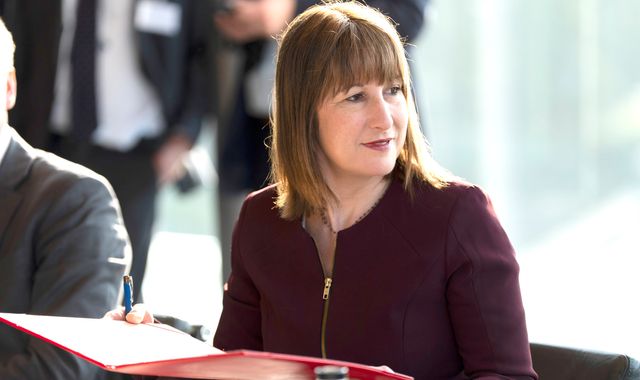Data from the Office for National Statistics (ONS) showed estimated net borrowing of £20.2bn in April – higher than the £17.9bn forecast by economists and the fourth highest April total on record.
That was despite a £1.7bn projected boost from employer national insurance contributions – hiked in October’s budget go help get the public finances in order and which kicked-in on 6 April.
The main reasons for the rise in borrowing included increases in public sector pay, along with higher benefits and state pensions, the ONS said.
Money latest: How travel insurance cost can surge
The data will do nothing to ease nerves over the state of the nation’s coffers amid renewed concerns Rachel Reeves may be forced to act again, in the autumn budget, to meet her “non-negotiable” fiscal rules.
The Chancellor was forced to restore a £10bn buffer at the spring statement in March, led by planned welfare curbs.
A further restoration of headroom may be on the cards in October, given the economy is forecast to slow sharply during the second half of the year.
The run-up to next month’s spending review – which sets budgets for government departments – has been dominated by a political row over one of her first actions in the role, which saw universal winter fuel payments stopped.
Prime minister Sir Keir Starmer confirmed on Wednesday that a U-turn, of sorts, is on the cards.
The prospect of a higher bill ahead will do nothing to ease the cost of servicing government debt, with bond market investors continuing to demand a higher premium to hold UK gilts.
Their concerns include not only the forecasts for slowing growth but also persistent inflation.
One good bit of news for Ms Reeves was a downwards revision by the ONS to its government borrowing figure for the last financial year.
The total dropped by almost £4bn to £148.3bn.
The shift was explained by higher tax receipts but the sum still remained about £11bn above the updated forecast by the Office for Budget Responsibility.
Chief secretary to the Treasury, Darren Jones, said of the ONS figures: “After years of economic instability crippling the public purse, we have taken the decisions to stabilise our public finances, which has helped deliver four interest rate cuts since August, cutting the cost of borrowing for businesses and working people.
“We’re fixing the NHS, with three million more appointments to bring waiting lists down, rebuilding Britain with our landmark planning reforms and strengthening our borders, delivering on the priorities of the country through our plan for change.”
Read more from Sky News:
Bitcoin hits new record high
Inflation at highest level since January 2024
There is a growing school of thought that Ms Reeves will need to raise taxes in October if she is to meet her commitments, including her fiscal rules.
Lindsay James, investor strategist at wealth management firm Quilter, said: “The decision to hold off on tax rises in the Spring Budget increasingly looks like a temporary reprieve.
“As borrowing continues to outstrip forecasts and debt interest costs remain elevated, pressure is building on the Chancellor to make tougher choices,” he wrote.





























